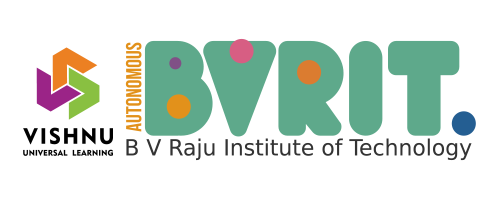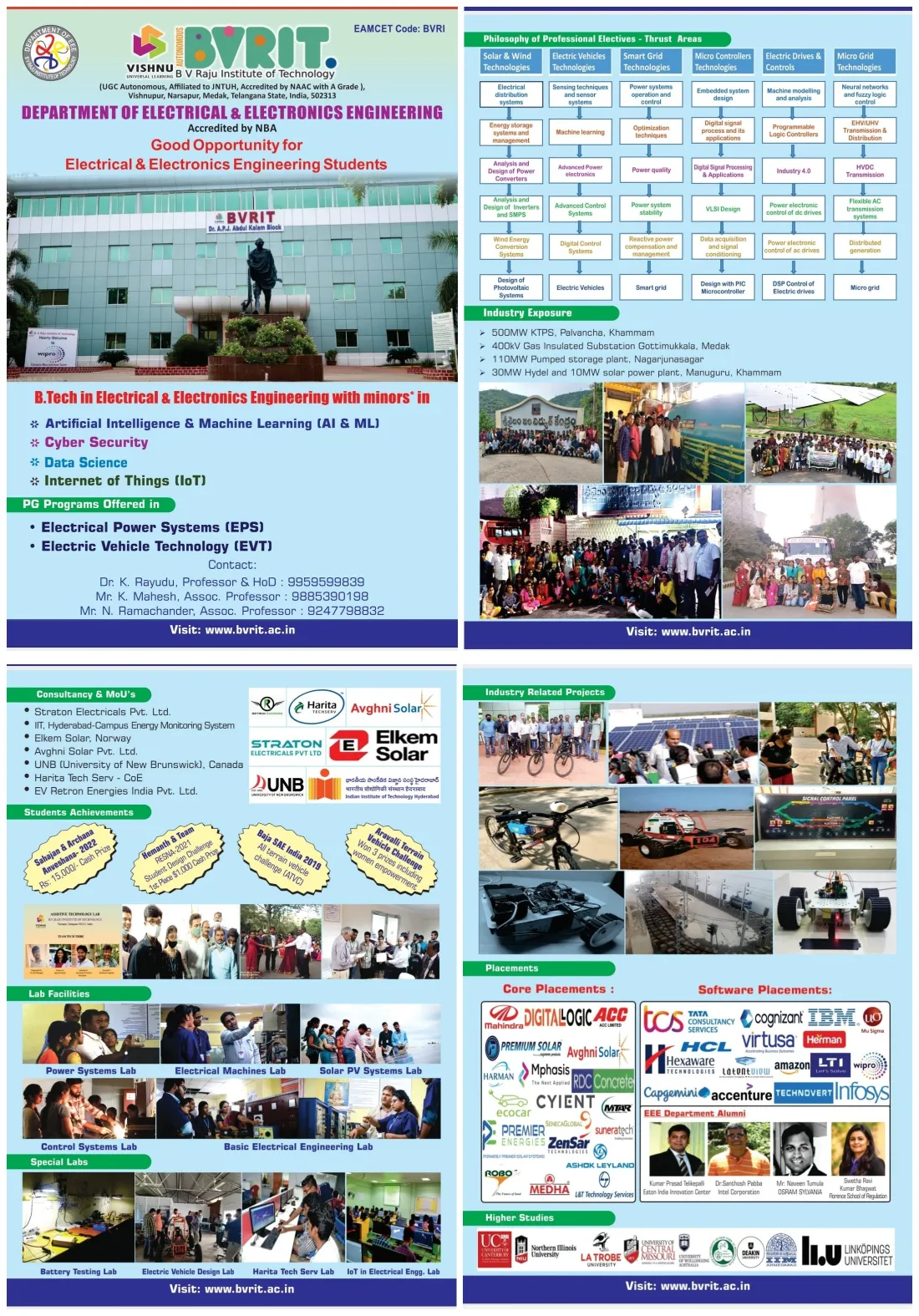Overview
About Department
The EEE curriculum emphasizes both depth and breadth within the sub-disciplines of Electrical Engineering. All students will specialize in Electronic circuits and devices while being provided the opportunity explore Signals and systems theory, Electrical Machines, Control Systems, Power systems, Power Electronics, Integrated Circuits, Energy Systems, Computer software and hardware, as well as mechanical, biological, and environmental systems. Through this coursework, students also gain experience in the Engineering design process, the Engineering activity that requires creative synthesis as well as analysis.
The Electrical and Electronics Engineering Department, has been so structured, in terms of experienced staff and excellent laboratory facilities, as to equip the students with knowledge of cutting edge technologies and provide them adequate hands-on experience through laboratory work, innovative projects in Industry and Research Establishments, seminars/workshops and so on.
Modern research and innovative teaching are trademarks of the Department of Electrical & Electronics Engineering. The department offers exceptional research facilities together with outstanding classroom instruction. With an abundance of teaching and research expertise, our faculty members strive to provide the best possible education. Through the identification of areas of interest and participation in supported research initiatives and assistance from consultants, it also fosters active industry-institution engagement.
The major research areas include, AI applications to power systems, Demand Side Management System, Application of Soft Computing methods in Power System, IoT Applications in Electrical Engineering, Reliability analysis of PV Inverters, Grid Integration of Solar PV system, Modelling of Power Converters for PV power conversion, Soft computing Techniques and applications to power electronics, Electric Vehicle charging infrastructure, Real-Time Monitoring & Data Analysis of a Campus Distribution Grid, Smart Distribution System etc.
The Department of Electrical & Electronics Engineering has started the B. Tech Program in the year of 1997 with the intake of 40 and the current intake is 60. Department offers a two-year full-time M. Tech program in Electrical Power Systems from the academic year 2012 – 2013. The intake has been revised to 12 from the Academic Year 2023 – 24. The Department also offers a two-year full-time M. Tech program in Electrical Vehicle Technology from the academic year 2023 – 2024 with an intake of 12, admitted through GATE / TSPGECET, the common entrance test, for both PG Programs.
- The Electrical and Electronics Engineering Department in BVRIT, established in 1997 with an intake of 40.
- Granted provisional accreditation for Three years for the period 10.02.2009 to 10.02.2012.
- Granted provisional accreditation for Two years for the period 08.11.2013 to 08.11.2015.
- Granted provisional accreditation for Three years for the period 01.05.2017 to 01.05.2020.
- Granted provisional accreditation for Three years for the period 01.07.2022 to 30.06.2025.
- JNTUH recognized the Department of Electrical and Electronics Engineering as Research Centre for the period of 3 years from 2022-2025.
3
Program offered
25
Faculty members
1000+
Students graduated
500+
Research papers
Programs Offered
B.Tech-Electrical and Electronics Engineering
60
Intake
M.Tech-Electrical Power Systems
12
Intake
M.Tech-Electric Vehicle Technology
12
Intake
Department Vision
To achieve excellence in education, meaningful & innovative research and service dedicated to advancing the field of Electrical and Electronics engineering.
Department Mission
- To pursue excellence in electrical and electronics engineering education and research by providing positive and professional, high quality, relevant education using latest technology and educational techniques.
- To enable student’s skills to effectively communicate, analyze, create, and link knowledge in the multi-disciplinary fields, with the emphasis on quantitative approaches and methods.
- To inspire student community to work in cohesion, that exemplifies the core and ethical values for the purpose of improving and developing systems that solve complex problems including, analytical, design and research skills for their career growth.
- To involve itself with technology oriented expertise and also to contribute to the social uplift of the society.
Department PEO's
B.Tech. in Electrical and Electronics Engineering
PEO-1: To develop the concepts of electrical and electronics engineering in design and product realization to meet the needs of industry and organizations.
PEO-2: To demonstrate their ability to work effectively as a responsible professional in a team and as an individual.
PEO-3: To have an understanding of the importance of life-long learning and professional development with a background that allows in pursuing advanced studies in electrical and electronics engineering or related fields.
Program Outcomes (POs)
B.Tech. in Electrical and Electronics Engineering
Engineering Graduates will be able to:
Engineering knowledge: Apply the knowledge of mathematics, science, engineering fundamentals, and an engineering specialization to the solution of complex engineering problems.
Problem analysis: Identify, formulate, review research literature, and analyze complex engineering problems reaching substantiated conclusions using first principles of mathematics, natural sciences, and engineering sciences.
Design/development of solutions: Design solutions for complex engineering problems and design system components or processes that meet the specified needs with appropriate consideration for the public health and safety, and the cultural, societal, and environmental considerations.
Conduct investigations of complex problems: Use research-based knowledge and research methods including design interpretation of data, and synthesis of the of experiments, analysis and information to provide valid conclusions.
Modern tool usage: Create, select, and apply appropriate techniques, resources, and modern engineering and IT tools including prediction and modeling to complex engineering activities with an understanding of the limitations.
The engineer and society: Apply reasoning informed by the contextual knowledge to assess societal, health, safety, legal and cultural issues and the consequent responsibilities relevant to the professional engineering practice.
Environment and sustainability: Understand the impact of the professional engineering solutions in societal and environmental contexts, and demonstrate the knowledge of, and need for sustainable development.
Ethics: Apply ethical principles and commit to professional ethics and responsibilities and norms of the engineering practice.
Individual and team work: Function effectively as an individual, and as a member or leader in diverse teams, and in multidisciplinary settings.
Communication: Communicate effectively on complex engineering activities with the engineering community and with society at large, such as, being able to comprehend and write effective reports and design documentation, make effective presentations, and give and receive clear instructions.
Project management and finance: Demonstrate knowledge and understanding of the engineering and management principles and apply these to one’s own work, as a member and leader in a team, to manage projects and in multidisciplinary environments.
Life-long learning: Recognize the need for, and have the preparation and ability to engage in independent and life-long learning in the broadest context of technological change.
Department PSO's
PSO-1: Engineering graduates can explore knowledge of electrical & electronics engineering in core as well as multidisciplinary areas in innovative, dynamic and challenging environment, for the research based teamwork.
PSO-2: Engineering graduates can provide hands on experience in the fields of Non-conventional and Renewable Energies.
What is Electrical Engineering?
Electrical engineering deals with the study and application of physics and mathematics combined with elements of electricity, electronics, and electromagnetism to both large and small scale systems to process information and transmit energy. It covers a wide range of sub-fields, including electronics, digital computers, power engineering, telecommunications, control systems, RF engineering, and signal processing.
Three reasons to study Electrical Engineering
- Always in demand: The technology sector grew rapidly in the last decades and so did the demand for those who create, understand and develop electrical control systems, which means good job opportunities for you after graduation.
- High salaries: As an electrical engineer, you will begin your career higher on the salary ladder than social science graduates.
- Future technologies: Electrical engineering is at the forefront of developing new technologies for a number of industries including those of transport, healthcare, construction and robotics.
How to study Electrical Engineering?
- Courses in electrical engineering will teach students how the industry works, equipping them with the engineering skills necessary to design, assess and improve electrical systems.
- After learning the foundations, students can specialise in their chosen area of interest (examples include power generation and supply, communications and media, and robotic systems). The courses comprise laboratory work, tutorials, lectures, project work in groups and as individuals.
- It is often recommended that students graduating with a bachelor’s degree in electrical engineering go on to work before moving on to a master’s study. By doing so, bachelor degree holders obtain real-world practical experience. This can also be done during undergraduate studies via internships, or projects.
What kind of jobs can I get by studying Electrical Engineering?
Graduates with a degree in Electrical engineering go on to pursue careers in energy, construction, manufacturing, transport, telecommunications, engineering and computing. Dependent on the stage of your career, or project phase, electrical engineers can work in various locations, whether that be in laboratories, offices, and building sites.
Key Features
- Best-in-class infrastructure and faculty profile
- Curriculum is designed to facilitate students in pursuing higher education in India and abroad
- Strong industry interface with leading companies like Schneider Electric, BHEL, etc.
- Placements offered by various core companies
- Active participation in consultancy, testing and research work.
Core Competencies
- Lighting & Energy Studies.
- Power & Control Systems.
- Power Electronics & Drives.
- Solar PV Cells/Modules Testing.
- Consultancy services in implementing solar PV projects.
- Electric Vehicle’s (EV) design and development.
Department Alumni
The EEE Alumni continue to network with their Alma mater, the EEE Dept of BVRIT, from their work place(s) in India and abroad. While most of them are employed in reputed Industries/Companies such as Infosys, Satyam, Wipro, CTS, TCS, GENCO, TRANSCO, NRSA, Philips Lighting Electronics, North America etc, others are pursuing their higher studies in reputed educational institutions/Universities in India and abroad.
List the Names of top eight most renowned Alumni of the Department along with Organizations.
S. No. | Name of the Alumni | Year of Study | Current Designation |
1 | Mr.NAVEEN TUMULA | 1998-2002 | Director Product Marketing, Osram, Sylvania |
2 | Dr.SANTHOSH PABBA | 1999-2003 | Lead Packing Engineer, Intel Corporation, Hillsboro, USA |
3 | SWETHA RAVIKUMAR BHAGWATH | 2005-2009 | Research Associate, Florence school of Regulation, Robert Schuman Centre, EUI |
4 | Mr.GURU SRAVAN SIMHA | 1999-2003 | Program Manager & Principle Consultant, Infosys Limited |
5 | Mr.SUDHEER PATELGER | 2006-2010 | Scientist/Engineer ”SD”, ISRO Satellite Centre, Banglore |
6 | Mr.ARAVIND REDDY NAYANI | 2006-2010 | Electrical Design Engineer, Focus PDM, Dr Menlo Park, CA 94025, USA |
7 | Mr.CH. NARESH KUMAR | 2005-2009 | Executive Engineer, Hindustan Aeronautics Limited |
8 | Mr.BALAJI KUNDETI | 2005-2009 | Assistant Manager, NTPC Limited |
9 | Ms.DEEPIKA VADLA, (M.Tech) | 2014-2016 | R&D Engineer, RenewSys India Pvt Ltd |
10 | Mr.CHAITANYA, (M.Tech) | 2013-2015 | Entrepreneur (solar PV projects) |















